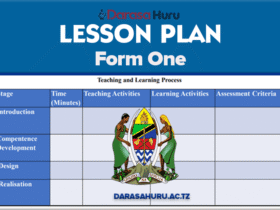CBM Combination Courses and Jobs You Can Do After Graduation
The CBM combination involves the study of three core subjects:
Chemistry, Biology, and Mathematics (pure). Chemistry explores the composition, properties, and reactions of matter, while Biology focuses on the study of living organisms, their structures, functions, and interactions.
Mathematics (pure) provides the analytical and quantitative tools necessary for modeling biological systems, analyzing experimental data, and solving mathematical problems in chemistry and biology.
By combining these subjects, students gain a multidisciplinary perspective and develop critical thinking, problem-solving, and analytical skills essential for scientific research and professional practice.
CBM Combination Courses and Jobs You Can Do After Graduation
Degree Courses for CBM: In Tanzania, students with a background in CBM have access to a diverse range of degree courses tailored to their interests and career aspirations. Some of the degree courses available include:
1. Bachelor of Science in Chemistry
2. Bachelor of Science in Biology
3. Bachelor of Science in Mathematics
4. Bachelor of Science in Biochemistry
5. Bachelor of Science in Pharmacy
6. Bachelor of Science in Environmental Science
7. Bachelor of Science in Biotechnology
8. Bachelor of Science in Agricultural Science
9. Bachelor of Medicine and Bachelor of Surgery (MBBS)
10. Bachelor of Science in Nutrition and Dietetics
11. Bachelor of Science in Microbiology
12. Bachelor of Science in Chemical Engineering
13. Bachelor of Science in Forestry
14. Bachelor of Science in Zoology
15. Bachelor of Science in Applied Mathematics
16. Bachelor of Science in Genetics
17. Bachelor of Science in Marine Biology
18. Bachelor of Science in Pharmaceutical Chemistry
19. Bachelor of Science in Environmental Chemistry
20. Bachelor of Science in Wildlife Management
CBM Combination Jobs Opportunities You can Do After Graduation

Graduates with a background in CBM have diverse career opportunities available to them in Tanzania. Some of the jobs and opportunities include:
1. Chemist: Conducting chemical analyses, experiments, and research in industries such as pharmaceuticals, food and beverages, cosmetics, and environmental science.
2. Biologist: Studying living organisms, their structures, functions, and interactions, with applications in fields such as healthcare, agriculture, conservation, and biotechnology.
3. Mathematician: Applying mathematical theories, methods, and models to solve practical problems in various industries such as finance, engineering, computer science, and scientific research.
4. Pharmacist: Dispensing medications, providing pharmaceutical care, and advising patients on the safe and effective use of drugs in healthcare settings such as hospitals, clinics, and pharmacies.
5. Environmental Scientist: Conducting research, assessments, and monitoring to evaluate and mitigate environmental impacts of human activities, with applications in environmental consulting, government agencies, and NGOs.
6. Medical Doctor: Diagnosing, treating, and preventing diseases and injuries in patients, with opportunities in hospitals, clinics, medical centers, and public health organizations.
7. Agricultural Scientist: Conducting research, extension, and outreach activities to improve agricultural productivity, sustainability, and food security, with opportunities in government agencies, research institutions, and agribusiness companies.
8. Microbiologist: Studying microorganisms and their roles in health, agriculture, industry, and the environment, with opportunities in healthcare, pharmaceuticals, biotechnology, and research.
9. Chemical Engineer: Designing, optimizing, and managing chemical processes and products in industries such as manufacturing, energy, environmental protection, and materials science.
10. Nutritionist/Dietitian: Providing dietary advice, education, and counseling to individuals and communities to promote health and prevent diseases through proper nutrition and lifestyle choices.
11. Forester: Managing forest resources, ecosystems, and landscapes for conservation, timber production, biodiversity conservation, and ecosystem services such as carbon sequestration and watershed protection.
12. Zoologist: Studying animals and their habitats, behaviors, and ecological roles, with opportunities in wildlife conservation, zoos and aquariums, education, and research.
13. Geneticist: Studying genes, genetic variation, and heredity, with applications in healthcare, agriculture, forensics, and biotechnology.
14. Marine Biologist: Studying marine organisms, ecosystems, and habitats, with opportunities in marine conservation, fisheries science, aquaculture, and marine tourism.
15. Wildlife Manager: Managing wildlife populations and habitats for conservation, tourism and sustainable use, with opportunities in national parks, wildlife reserves, conservation organizations, and ecotourism ventures.


































Leave a Reply